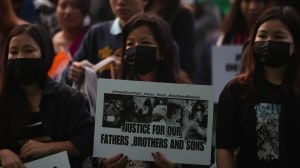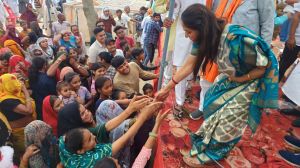- India
- International
In Tripura, BSF personnel on patrol need more than guns to stay safe
BSF jawans in this Tripura border area patrol in a suit which includes a full body uniform, boots, hand gloves, face masks and helmets. They also have to carry an improvised portable fogging device made out of a tin can and a bit of wire.
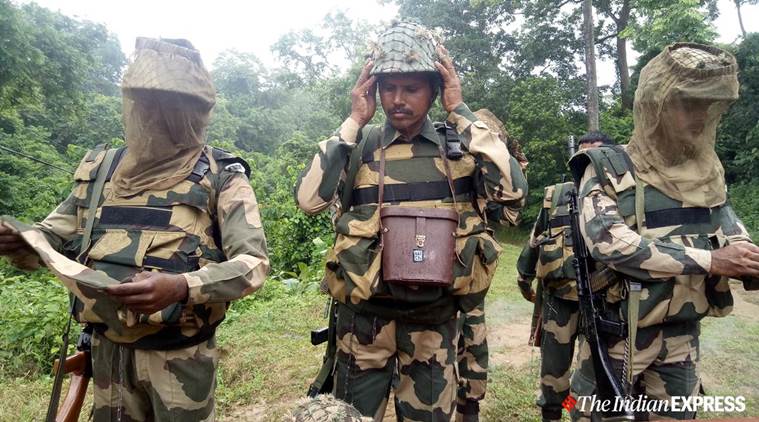 With masks and fogging kits, BSF jawans in Tripura have another battle to fight: mosquitoes. Express Photo by Debraj Deb
With masks and fogging kits, BSF jawans in Tripura have another battle to fight: mosquitoes. Express Photo by Debraj Deb
As BSF personnel patrol the 856-km border Tripura shares with Bangladesh, they are also armed with portable fumigators and wear net masks along with their regular uniforms and boots. The unfenced patches along the international border in the remote Sipahijala and Dhalai districts here are among the most susceptible to vector borne diseases like Malaria.
BSF Commandant P P Nautiyal, who heads 71 Battalion deployed at Ambassa in Dhalai district, told indianexpress.com that all 12 Border Out Posts (BOP) under his jurisdiction come under malaria endemic zone and runs the risk of infection.
“Our BOPs are completely under malaria infested areas. We religiously conduct fogging in all BOPs. Anti-malaria kits are available in the outposts. All jawans have to compulsorily use impregnated mosquito nets, apply Odomos, cover all exposed areas and use face masks, hand gloves and other anti-malaria precautions during patrolling,” the officer said.
Commandant Nautiyal said BSF jawans patrol in a suit which includes a full body uniform, standard boots, hand gloves, face masks and helmets. They are also required to carry an improvised portable fogging device made out of a tin can and a bit of wire.
There is more protocol in place. After a jawan moves to a battalion headquarters from these malaria prone forests, they are put in quarantine for 10 days, during which they undergo mandatory blood test thrice to make sure they didn’t bring back malaria parasite with them. They need to follow certain protocol even when they are away home on leave.

The BSF claims there hasn’t been a single malaria casualty among its personnel in Tripura till now. However, they admit that many of their soldiers were taken ill by malaria parasite and shifted to hospitals for treatment.
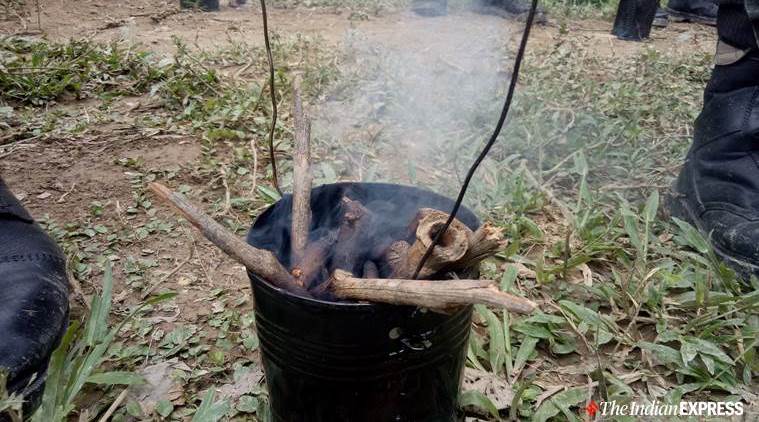 The portable fogging device made out of sticks and a tin can that the BSF jawans have to use to keep mosquitoes away. Express Photo by Debraj Deb
The portable fogging device made out of sticks and a tin can that the BSF jawans have to use to keep mosquitoes away. Express Photo by Debraj Deb
Assistant Sub-Inspector Raj Kumar, a 53-year-old who has been serving in Tripura since 2003, posted at BOP Viswas adjoinIng Khagrachari district of Bangladesh, has served in all border states except Gujarat. “But here all jawans on the ground have to follow special precautions for malaria along with standard duty in the border. I learnt using these techniques for the first time in 2003.” Khagrachari has always been one of the major hideouts of north eastern insurgents.
The terrain here is dominated by tall trees and frequent shrub growths, which makes it tough for jawans on towers to keep a watch on all areas. So, foot patrols are essential to maintain tight security.
Among the younger personnel deployed here, Constable Sindhi Kumar from Maharashtra says he found the experience quite unique when he first came here three years back. He had previously served in Gujarat and Assam but never encountered this bizarre protection gear. “We have to don face masks, hand gloves and full body suit each time we are on duty,” he said. Asked if the extra protection makes it tough to get the job done, he said, “You get habituated with it”.
Nursing assistant Constable Dattatreya Yadav says each BOP has nursing assistants armed with primary medical equipment. These include a malaria kit, which makes sure no infected jawan goes undiagnosed, running the risk of further spread of the disease.
Villager Goutam Ghosh said their area has faced malaria for decades. “These days the malaria crisis has come down, but PF malaria cases are still high,” he said, remembering his elder brother who died of malaria several years back.
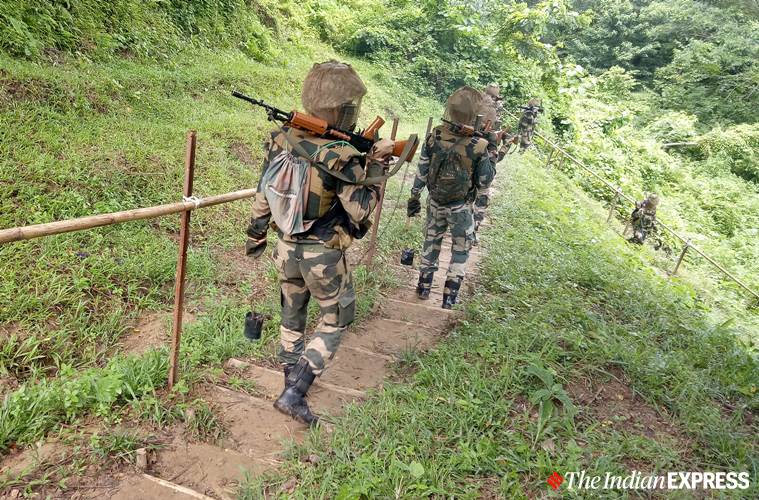 While there have been no deaths among the BSF personnel, the unit takes no chances and several precautionary measures are in place. Express Photo by Debraj Deb
While there have been no deaths among the BSF personnel, the unit takes no chances and several precautionary measures are in place. Express Photo by Debraj Deb
Tripura hit headlines with 96 malaria deaths and over 51,000 malaria positive cases in a single year in 2014. A senior official from the National Health Mission’s (NHM) state chapter said 51,240 patients were diagnosed with malaria in 2014 wherein 96 persons succumbed. Though the figures have come down since then, malaria cases doubled in 2018 compared to 2017.
Among the infected ones, 96.9 per cent cases were plasmodium falciparum or PF malaria, commonly known as cerebral malaria. The rate of cerebral malaria came down in the following year but again rose to 96.33 per cent in 2018. Malaria deaths doubled in 2018 compared to the previous year, as did the number of malaria patients.
This year, over 96 per cent of malaria patients in Tripura have cerebral malaria. No deaths have been reported till date but the fear of malaria hangs on.
Apr 25: Latest News
- 01
- 02
- 03
- 04
- 05

















